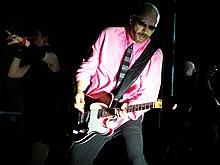Duke Erikson
Duke Erikson | |
|---|---|
 Duke Erikson performing live | |
| Background information | |
| Birth name | Douglas Elwin Erickson |
| Born | January 15, 1951 Lyons, Nebraska, US |
| Genres | Rock, alternative rock |
| Occupation(s) | Musician, songwriter, record producer, remixer |
| Instrument(s) | Guitar, keyboards |
| Years active | 1978–present |
| Labels | Geffen Records, A&E Records, Atlantic Records |
Douglas Elwin "Duke" Erikson (born January 15, 1951, in Nebraska), is an American songwriter, multi-instrumentalist, and producer, best known as the bassist and additional guitarist of the alternative rock band Garbage, which has sold more than 17 million albums worldwide.[1] Before co-founding Garbage, Erikson was a founding member of the popular Midwestern bands Spooner and Fire Town.
Early life
This section of a biography of a living person needs additional citations for verification. (January 2015) |
Duke Erikson was born in Lyons, a small rural community in Nebraska. His first musical instrument was the piano, and his second was the guitar. At the age of 16 he joined his first band, The British, which was inspired by his passion for the British beat movement. The band performed at local dances and high-school hops, often publicizing their appearances with posters announcing that "The British Are Coming". When Erikson completed his first scholastic cycle, he began studying art history at Wayne State College in Nebraska, where he taught drawing for "a couple of semesters".[2] During this period he also worked as a carpenter and occasional truck driver.
Musical career
This section of a biography of a living person needs additional citations for verification. (January 2015) |
1974–1985
Erikson formed the rock band Spooner in 1974 with two fellow musicians in Madison, Wisconsin. Erikson sang lead vocals, played keyboards and guitar, and became the band's principal songwriter, his compositions being described as "strangely seductive" in the press.[citation needed] Spooner became a quartet when Butch Vig joined them on drums.[3] Spooner released two well-received albums, Every Corner Dance and The Wildest Dreams, and toured across the Midwest.[4] Rolling Stone magazine called their debut album "a convincing collection of sparkling pop music", to which "Erikson's edgy, poetic slice-of-small-town-life lyrics add a genuine, idiosyncratic touch".[5]
In 1983, Erikson helped Vig and Steve Marker establish Smart Studios in Madison, where he helped to design the studio interior and where he has carried out engineering, production and remixing work for a series of local and international rock artists.[original research?][citation needed]
1986–1993
In 1986, Erikson collaborated again with Vig to form the garage-rock band Fire Town, in which he played guitar and contributed vocals. The band released two albums, In the Heart of the Heart Country and The Good Life, the latter on Atlantic Records. Rolling Stone praised their debut as "a striking, thoughtful album" with "killer harmonies".[6]
While Fire Town had disbanded by 1989, Spooner had an unexpected late resurgence: their single "Mean Old World" became a hit, prompting them to re-form, make a new album – The Fugitive Dance – and embark on a tour before they disbanded in 1993.[citation needed]
1994–present
This section needs expansion. You can help by adding to it. (January 2015) |
After Marker saw singer Shirley Manson performing with her band Angelfish on MTV's 120 Minutes in 1994, Erikson helped to persuade Vig that they should audition her for their new band,[original research?][citation needed] which became Garbage.
In addition to co-writing on the band's albums, contributing guitar, keyboards, and bass, Erikson was instrumental in the design of the distinctive artwork for their first two albums, Garbage and Version 2.0.[dubious – discuss][citation needed]

In a major feature on the band for The Sunday Times in 1998, the British journalist Tony Barrell described Erikson's persona in Garbage as "the cool dude with the goatee and the Mr Spockish demeanour".[7] Though sometimes a taciturn presence in the band, Erikson has been known to contribute an air of dry humour to media interviews. During a discussion in 1996 about the interpersonal chemistry within Garbage, he deadpanned: "We have a little room where we go and cry."[8]
Erikson's extracurricular projects include the production of other artists. He produced the single "If You Go" by the Greenlandic singer Simon Lynge, which received regular airplay in Britain during 2011 after being added to the BBC Radio 2 playlist.[9]
Erikson is on the board of directors of the acclaimed UK independent record label LO-MAX Records, which is home to The Wrens, The Go-Betweens, Kevin Ayers, and Simon Lynge, and he is currently co-producing a historical documentary series with Lo-Max Films.[citation needed] Erikson has worked extensively on sound restoration for this series.[citation needed]
Erikson's daughter, Roxy Erickson, is a photographer based in London, England.[10]
Discography
Spooner
Fire Town
|
GarbageStudio albums
Compilation albums
|
References
- ^ "Famous Scots exhibition – Shirley Manson". homecomingscotland2009.com. Retrieved March 11, 2012.
- ^ Jancee Dunn (October 31, 1996). "Work in Progress". Rolling Stone. Retrieved March 11, 2012.
- ^ "Spooner Waxes A Winner". City Lights, November 19, 1982 issue. Retrieved March 11, 2011.
{{cite web}}: Italic or bold markup not allowed in:|publisher=(help) - ^ "Welcome to Spooner Town", by Andy Davis, Record Collector, issue #209, January 1997
- ^ Lloyd Sachs (March 7, 1983). "Every Corner Dance". Rolling Stone. Retrieved March 11, 2012.
- ^ David Wild (July 16, 1987). "In The Heart of the Heart Country". Rolling Stone. Retrieved March 11, 2012.
- ^ Tony Barrell (May 17, 1998). "Shirley Bossy". The Sunday Times. Retrieved September 27, 2014.
{{cite web}}: Italic or bold markup not allowed in:|publisher=(help) - ^ Tim Sismey (April 10, 1996). "Garbage Interview". Retroactive Baggage. Retrieved March 13, 2012.
- ^ "Simon Lynge: News". Archived from the original on January 21, 2012. Retrieved March 11, 2012.
{{cite web}}: Unknown parameter|deadurl=ignored (|url-status=suggested) (help) - ^ "Roxy Erickson". Retrieved March 11, 2012.
External links
- Duke Erikson at IMDb
- Official Website Garbage
